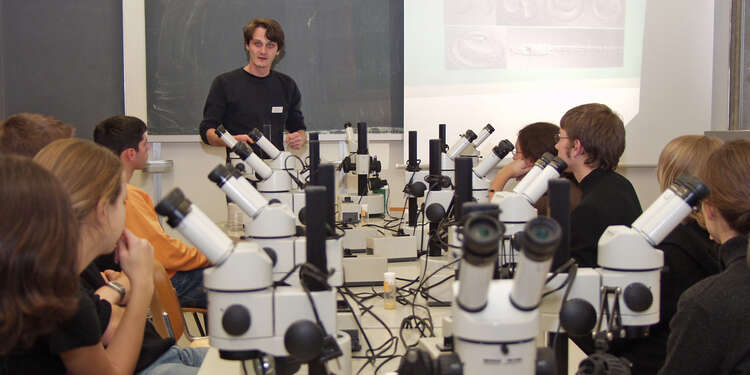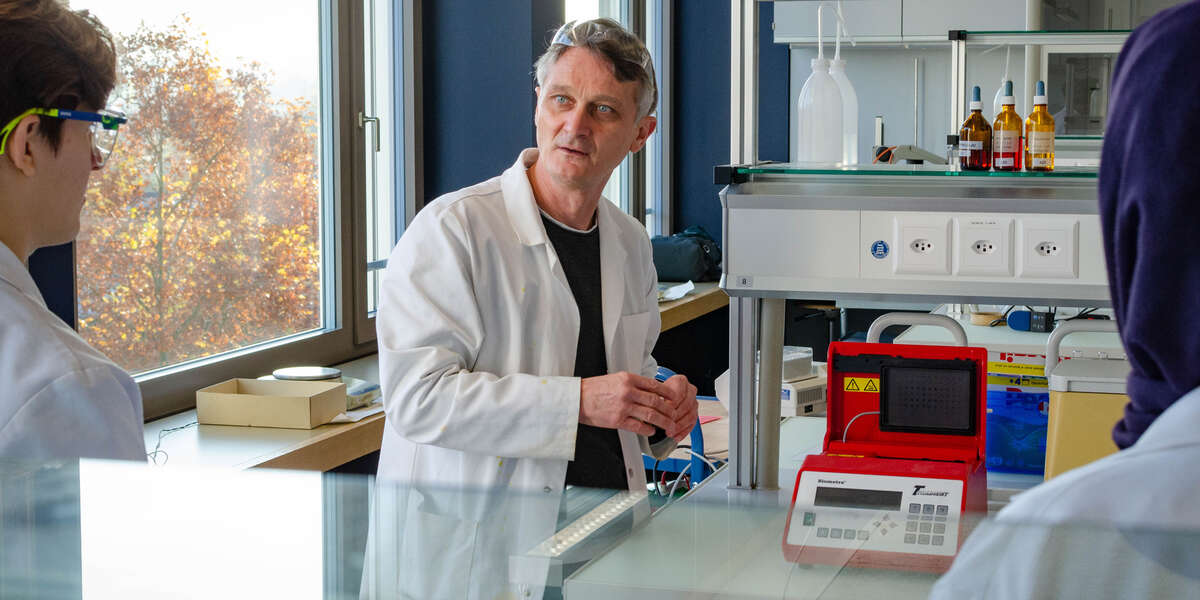When biology becomes a life’s passion
December 2020
He cherishes Walter Gehring’s Drosophila strains, an old PCR machine from the Biozentrum, his love for the Basel “Fasnacht” and a key to one of Basel’s old city gates, the Spalentor. Biozentrum alumnus Sacha Glardon is a passionate biologist, a man of many talents and still strongly connected to the Biozentrum 20 years after his departure.
Sacha, even though you left 20 years ago, you are still quite often at the Biozentrum, how come?
I never completely left the Biozentrum. I live close by and have a good relationship with some professors, who are former colleagues from the Gehring lab, such as Alex Schier or Markus Affolter. I attend public lectures offered by the Biozentrum, which fascinate me – sometimes accompanied by my class − or I knock on the door if a student wants to write a Matura project in biology. The willingness to support me and help me to carry out a project was always great. And just recently Alex contacted me because the Biozentrum wants to get a program off the ground, bringing biology to school children at home. At Bäumlihof Gymnasium we also have an old PCR machine and even some of Walter Gehring‘s Drosophila fly strains, no longer needed by the Biozentrum. At the time, someone called to ask whether we could use them. That was really great.
How long did you stay at the Biozentrum after finishing your studies?
Close to 10 years. After completing my diploma project with Walter Gehring, I had the chance to do my PhD with him, too. Of course, I seized the opportunity, after all it was a very exciting time during which we were trying to uncover how eye development is controlled.
How was it in Walter Gehring’s lab?
It was an amazingly stimulating time and I enjoyed it very much. Walter was the only zoologist at the Biozentrum and he incorporated an unbelievable diversity of animals in his research. His hypotheses were so all-encompassing, from the atom to the organism. It was the whole picture that always interested him and this fascinated me.
So the work with Drosophila also became your focus?
No, for my dissertation I actually worked more with sea squirts and amphioxi and established a gene database of these marine animals. The absolute highlight for me was the course «The developmental biology of marine organisms», which Walter always held at the marine biology institute at Banyuls sur Mer, in the south of France, and I went along to assist him. In Basel, Walter was always the internationally renowned, unapproachable professor, with whom you were on formal terms as a doctoral student. In Banyuls, though, he was a completely different person. I had the pleasure of getting to know him personally and always had a super time there.
Wouldn’t you have liked to stay in research then?
No, I wasn’t interested in taking on a professorship at some university abroad but rather wanted to stay in Basel. I am emotionally strongly attached to my hometown and love being here. I actually did stay on for a year as a postdoc in Walter’s group but then I realized that I was much more keen on teaching. I had been an assistant in the block courses and when schools requested a guided tour, I always enjoyed doing this. I also did a stint in the life sciences industry. My job was to get clinical studies going but that was pure “desk research”. At some point it became clear that this was not for me.

And then you became a teacher?
Yes. I got the opportunity to return to the Gehring lab as a senior postdoc. During these three years, I attended lectures on didactics and got to know a biology teacher from Bäumlihof. He told me more about being a teacher and I realized that that was my direction. Now I have already been teaching biology and chemistry for 16 years.
What fascinates you about the teaching profession?
As a biology teacher, though I have to adhere to the curriculum, I still can design much of the teaching myself and also deal with biology in a broad way. Had I stayed in industry or academic research, I would have become a specialist in some field, would participate in international meetings and probably have made a name for myself. As a teacher I haven’t reached the peaks but I have gained a very broad knowledge. I love my work and the contact to the young people with their contagious energy.
What kind of biology do you want to convey to your students?
My approach is to wake their interest and to make biology accessible to all of them, not only the future biologists but, for example, the future lawyers too. The two weekly hours in my class will be all they know about biology when they start their careers. I teach them important things like ecology and sustainability and I also want them to get a grasp of certain basics in biotechnology, so that they can understand what, for instance, the CRISPR/Cas method is. As in my career I mainly had an experimental approach to biology, I naturally do many experiments with the students. For example, I let them investigate how quickly slime mold grows. To do this they are required to collect data, take photos, count pixels and present the growth curve. It is very important to me that they not only experience biology as a descriptive exercise but rather learn to gather data and analyze this quantitatively and qualitatively. Furthermore, biology has an important task to fulfill in the society. With the modern life sciences, it is intertwined with our daily lives. The current coronavirus pandemic makes it very obvious: Biology is taking on a major role in our lives.
Speaking of Corona: Did you focus on the topic during the lockdown?
Yes, we were tackling immunology at that time. The students were very motivated and wanted to learn more about what happens in their body, how it defends itself, how viruses function and the difference between an epidemic and a pandemic. Using newspaper articles, we had discussions and learnt how to understand the curves shown.
And what do you do when you are not teaching?
I am very involved in Basel’s social life, the world of Fasnacht and the guilds. Somewhat exaggerated you could call me a “social junkie”. That is the reason that I didn’t wanted to leave Basel. I have belonged to a Fasnacht clique since I was a young boy. With time I became its president and as our clique is based at the Safranzunft, I became a member of this guild, the Saffron Guild, and with time a member of its board of management. And I also am part of the «Vorstadtgesellschaft zur Krähe», a social club located at Spalentor. I also have a key to the Spalentor itself and have also been there with my friends from the Biozentrum. And last but not least, I have a passion for the Theater Basel. It is something I go to privately but also with my students.
Curriculum vitae
Sacha Glardon has been working for 16 years at Gymnasium Bäumlihof as a biology and chemistry teacher. He studied biology at the Biozentrum, where he carried out research as a doctoral student and postdoc in Prof. Dr. Walter Gehring’s group for almost 10 years. He is the father of 2 daughters and lives in Basel.



